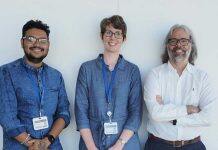Researchers at the University of Glasgow’s School of Biodiversity, One Health & Veterinary Medicine have been awarded £3m across four new projects. With a focus on sustainable aquaculture – the farming and harvesting of fish, shellfish and aquatic plants – the research team will focus on farmed salmon and seaweed across the four projects.
Led by Professor Martin Llewellyn and Dr Sofie Spatharis, the first project is funded with £2m from the new BBSRC Industrial Partnership Award, and will focus on plankton-based drivers of gill disease in farmed Atlantic salmon. The research will make use of the School of Biodiversity, One Health & Veterinary Medicine’s exciting new mobile marine aquaria, and combine genome-wide association studies, metabarcoding and causal model frameworks to identify drivers of gill-related mortality in salmon. The project also includes researchers from the Universities of Aberdeen and the Roslin Institute, as well as industry partners MOWI, Scottish Sea Farms, Bakkafrost, Esox Bio and Benchmark Genetics.


The second project is led by Dr Spatharis, Professor Llewellyn and Dr Simon Babayan in collaboration with Dan Smale from the Marine Biological Association in Plymouth, and was awarded £585,021 by the BBSRC 2023 Sustainable Aquaculture Partnerships for Innovation to study seaweed farming in Europe. The project, which will be carried out in collaboration with nine seaweed farms in the UK, Norway and Sweden, will focus on finding solutions to predict biofouling, the process whereby seaweed is contaminated with other unwanted organisms, effecting crop yield.
In the final two projects Dr Spatharis and Professor Llewellyn will work with a range of collaborators on new salmon farming research. This includes a project led by the Scottish Association for Marine Science from the BBSRC Sustainable Aquaculture Partnerships for Innovation to study sea lice detection in farmed salmon (with £102,000 to Glasgow) as well as project led by The Institute of Marine Research, Norway, developing new diagnostic approaches to pathogen detection (with £250,000 to Glasgow).
Dr Spatharis said: “I feel very lucky to be in Scotland and Glasgow Uni in particular, working with an amazing team of marine ecologists, making use of exciting new infrastructure for coastal research and working at the forefront of an expanding sustainable aquaculture industry.”
Professor Llewellyn said: “It is wonderful to see the University of Glasgow working more in the aquaculture space – we have much to offer. Aquaculture represents the future of food from the sea and pushing for a more sustainable footing is vital.”






































